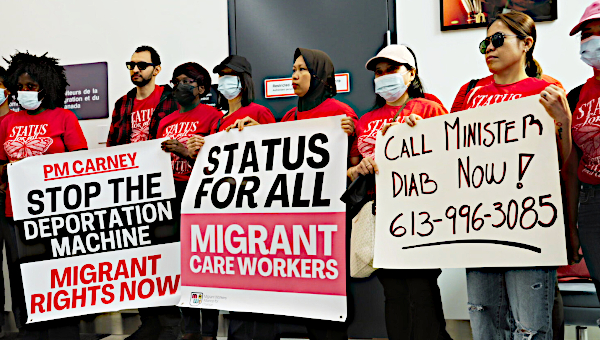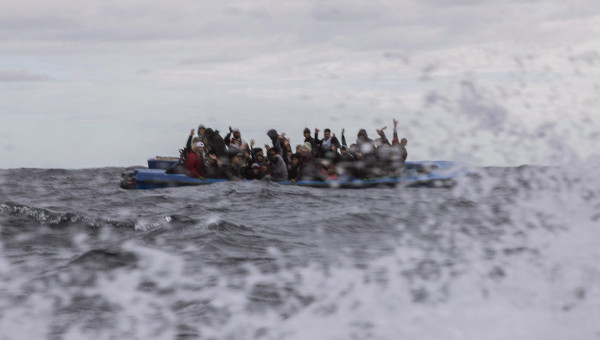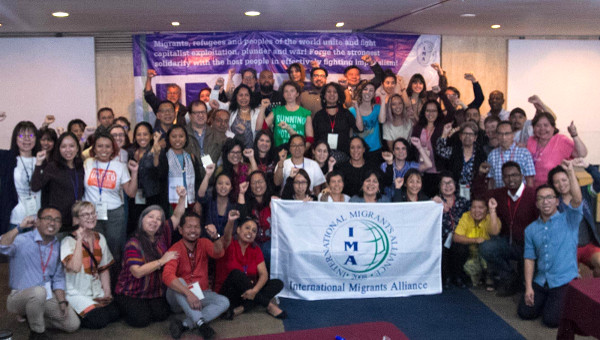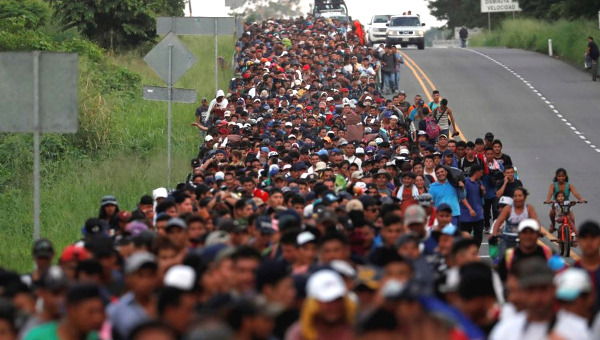Greece: 39 Months at City Plaza for Refugees Ends
On July 10th, 2019, the keys of squatted City Plaza, Athens, Greece, were handed back to the former employees of the hotel, to whom the mobile equipment in the building belongs. All refugees living at City Plaza have been moved to safe housing within the city.
On 22 April 2016, the Economic and Political Refugee Solidarity Initiative squatted the empty City Plaza building with a two-fold goal: to create, on the one hand, a space of safety and dignity in which to house refugees in the centre of the city and, on the other, to create a centre of struggle against racism, borders, and social exclusion; for the freedom of movement and for the right to stay.
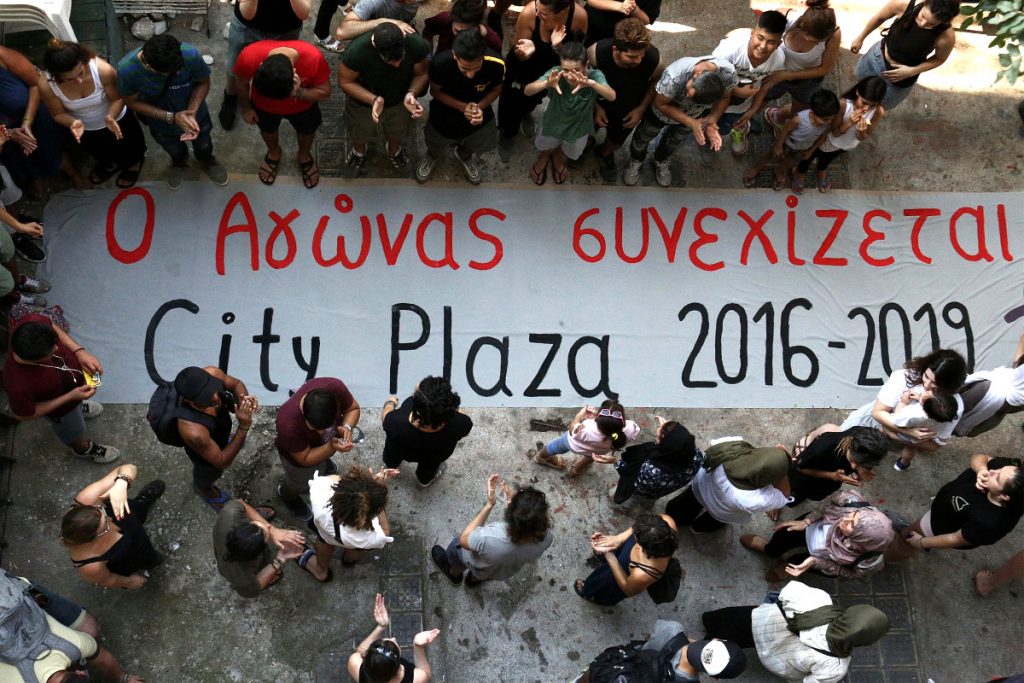
The decision to squat was taken at a critical political juncture. On 18th March 2016, one month before the squat opened, the EU-Turkey deal to restrict the movement of refugees to Europe was signed. It was the deal that marked the end of the “summer of migration” – the period which began in July 2015 when, under pressure from approximately one million people, the European borders “opened.” This was the deal that turned the islands of the Aegean into a sort of prison for migrants, and which turned mainland Greece into a trap for over 60,000 people.
The SYRIZA-ANEL government of the time, following its capitulation to the neoliberal management of the economic crisis, took on the implementation of a policy of control, deterrence and discouragement of migration. With the European Border and Coast Guard Agency (Frontex) and NATO patrolling the Aegean, with detention centres such as Moria on the islands, with awful camps as the only policy for housing refugees on the mainland, by punishing solidarity and the struggle of refugees. During that time, the housing issue was very pressing. The refugees who had arrived in Athens were either homeless or were being housed in the awful camps of Elliniko, Malakasa, or the port of Piraeus, while hundreds of people slept in tents or cardboard boxes in city streets and squares.
Squatting at City Plaza
It was while this was happening that a discussion began within the Economic and Political Refugee Solidarity Initiative, which led to the decision to squat City Plaza, a hotel on Acharnon street which remained shut for seven years. The decision had certain features of voluntarism, and was not justified by the forces at our disposal, nor by the state of the anti-authoritarian movement at the time. Yet it was a move which addressed the political situation and the great struggle of the refugees who had, over the previous months, opened the borders of Fortress Europe and thus won their right to freedom of movement. It also matched the massive and spontaneous social solidarity movement which developed along the length of the migration route.
City Plaza (CP) became an example of dignified housing, space for social solidarity and cooperation between locals and migrants. From its inception, City Plaza was organized around two key goals:
- to create a space for safe and dignified housing for migrants in the centre of the city, a space of solidarity and cooperation between locals and migrants.
- to function as a centre of struggle in which political and social demands by migrants and locals will interweave and complement each other.
CP proved in practice that the state policy of “hospitality” toward refugees is a mixture of harshness, incompetence, and political expediency. Where the solidarity movement, without any funding from formal institutions, without any “experts” or employees, managed to create one of the best housing spaces in the centre of the city, the state continued to abide by the trapping of refugees in makeshift camps and tents in the mainland, and by imposing a regime of refuting the rights of refugees and detaining them in hot spots on the islands, at the threat of deportation.
This contrast was the key element which led to mass support for CP at the beginning of its operation, by individual activists, organizations/collectives of the left, as well as by people who joined the movement for the first time there. Of course, because of the ownership status of the hotel, there were several attacks “from the left” which, fully aligned with the narrative of the owner and the petty bourgeois rhetoric on the “supreme human right to property,” attempt to belittle the effort, by spreading conspiracy theories (ranging from claims that we’re being funded by Soros, SYRIZA, the German State, to claims that we traffic drugs, firearms, children, and sex workers), slandering the collective and the activists who are part of it.
City Plaza proved in practice that refugees and locals can live together when, instead of isolation, punishment, and hatred, there is solidarity, struggle, and community. At the opposite pole from the camps, located outside the cities and in awful conditions, CP managed, in a difficult neighbourhood, until recently patrolled by neonazis, to brighten the formerly dark corner between Acharnon and Katrivanou, by giving it the character of security truly valued by those from below: the security of dignified housing, community, solidarity, and vitality of the people selflessly fighting for better lives.
At the same time, dozens of people showed their solidarity around the world. Through their daily presence, their participation in shifts, positive attitude and a large-scale international campaign for the financial support of the project. Dozens of crates of food and other essentials were sent to Plaza, thousands of people and groups made donations to support the project, which relied solely on donations for its survival.
City Plaza also served as a centre for struggle. Aiming to internationally denounce the anti-refugee policies of the SYRIZA-ANEL government and the EU, we brought to the fore topics such as criminal responsibility for shipwrecks and loss of human life, the delay or obstruction of sea rescue, the practice of illegal pushbacks in Evros and the Aegean, the conditions of imprisonment in hotspots. City Plaza hosted dozens of open discussions on the border regime, racism, the struggle for rights, often featuring contributions by well-known intellectuals from around the world, such as Judith Butler, Angela Davis, David Harvey, Alain Badiou, Sandro Mezzandra, among others. Yet the goal was not just to highlight issues relating to migrant struggles, but also to link them to the struggles of locals. In the rallies for International Worker’s Day, the Polytechnic Uprising, antifascist and feminist protests, the City Plaza block was present throughout the three years.
The City Plaza Community:
Practices, Rights, Cooperation
The answer to the question of what is City Plaza, is known to the thousands of people who passed through its doors: CP is a project for the realisation of a conception of everyday life which aims to empower those “from below,” in the constitution of a space of freedom, which practically realises an aspect of the society we envision.
Its mode of operation expressed a politics of everyday life which is in opposition to the dominant model of managing migration, especially to its “NGO-ization.” At the core of this voluntary contribution of time, effort, and emotion was not the “provision of services” to “the vulnerable” but the attempt to combat insecurity and fear, to empower and encourage confidence and trust in the collective. Help to refugees was re-politicized – and became solidarity and common struggle. Self-organization, shared responsibility and decision making were central, as was a constant reflection on the inequalities permeating relations within the project: localization, class, gender, language, education, etc.
Despite the inherent contradictions and difficulties, the collective experience of organizing everyday life was the foundation for building a strong community of solidarity. At the same time, in this context, and in contrast to dominant victimizing narratives, refugees and migrants became dynamic subjects with an active role on social and political life.
Daily life at CP was based on the principle of participatory organization and collective decision making and operations, processes particularly complex in a community of 350 people speaking different languages, and with different ethnic, class, and social backgrounds, and different plans for the future. Regular coordination meetings became the space in which equal discussion took place on issues of operation and organization, while House meetings were – especially in the beginning – a real lesson in how we can and should discuss, operate, and co-implement, as refugees and as locals. The organization of residents and solidarians into working groups was a component of organizing the project but also an essential basis for developing personal and political relationships amongst ourselves. The working groups were: Reception, Education, Children’s Activities, Health Centre, Kitchen, Security, Economics, Cleaning, Communications, as well as a self-organized Women’s Space.
In its 36 months of operation, City Plaza hosted over 2,500 refugees from 13 different countries. About 100 of the 126 rooms of the hotel hosted 350 refugees at any one time, while the remaining 26 either served as communal spaces (classrooms, women’s space, storage space) or to host solidarians from around the world. It was, after all, City Plaza’s political choice to not serve as a housing space for refugees but as a space of cohabitation and shared everyday life.
Yet we will not provide statistics referring to countries of origin, ages or ‘vulnerable’ cases. In contrast, we will provide ‘statistics’ on the enormous amount of resources that the movement was able to mobilize in order to keep City Plaza going:
- 812,250 hot meals were prepared by the kitchen team
- 74,500 work hours on security shifts
- 28,630 hours of shifts at reception
- 5,100 hours of language teaching and creative educational activities
- 69,050 rolls of toilet paper
However, the most important things cannot be counted. They have to do with human relationships, mutual respect and solidarity, emotions and experiences, optimism born out of common struggle.
The end of an era, the beginning of a new one
Such a project demands enormous resources. It is not a political squat which can stay closed for a couple of days in August without any problems. It is a space which demands a daily commitment, responsibility, and presence. Besides, the way we see it, self-organization is not automatic. To the contrary, it requires many hours of work, often endless processes of shared decision making, and interminable difficulties. In other words, self-organization and solidarity are not theory. They are action in the here and now. Action full of contradictions and life’s problems. In a society in which authoritarianism, war, capitalism, and competition between the subjugated is considered normal, while multiple divisions and hierarchies permeate us all, because of our origins, genders, and class backgrounds, self-organization is not a slogan. It is a struggle.
Unfortunately, as often happens in many self-organized projects, enthusiasm, commitment, and participation dwindle over time – especially when circumstances are so demanding. The fact that the overwhelming majority of City Plaza residents are in transit made it impossible to hand the operation of the squat completely over to the refugees as most of them, sooner or later, left for Europe. At the same time, the material resources required for a project of such size – for food, hygiene products, medications, building maintenance – became harder to come by, despite the fact that comrades throughout Europe have demonstrated extraordinary commitment.
On the basis of all of the above, shortly before City Plaza celebrated its two-year anniversary, and following calls to collectives and spaces which supported the project from its inception, there opened a difficult and contradictory discussion on how long City Plaza can carry on, or whether and how it should adapt, given that we did not wish to see the project decline. There was a dilemma on whether we would move toward the direction of “normalizing/legalizing” the squat or toward completing the project, while also looking for new ways to keep the community it created alive in a different context.
The first option was found to be politically undesirable, as it clashes with City Plaza’s character as a political alternative to NGO-ization, and leads to a disconnect between the issues of safe housing and collective struggle and rights demands more generally.
We decided that, despite it being a difficult choice, City Plaza should rightly close the way it began and operated: as a political project, by protecting the central element which turned it into a example, that is organization from below, safe and dignified living, community of struggle, and addressed to society as a whole.
During the House meeting of 26th May 2018, we jointly decided on this direction – not without contradictions and disagreements – and there was an extensive discussion about how to implement such a decision. Beginning in June 2018, City Plaza did not accept new residents, while there was a collective commitment that the project would not wind down until every resident had found acceptable accommodation. This commitment was not at all simple to implement. The wider circumstances of dealing with the refugee question – both from the point of view of the SYRIZA-ANEL government and from the point of view of NGOs, did not provide an opportunity to provide institutionally guaranteed housing to residents, while other spaces and squats could not house such a large number of refugees, despite positive attempts to support this.
One year on, and while the project was winding down, the expected change in the political landscape, with the imminent re-election of New Democracy, made it imperative to once more address the pace at which the project is progressing toward its close, taking into account the fact that, over the past several months, several refugees had gradually moved to safe housing. Plaza has two pending court orders for its evacuation, while high-ranking New Democracy members made daily references to the “destruction of private property” and the “lawlessness” at City Plaza. In this respect, evacuation could be used as a deterrent, while many refugees, especially those with no fixed legal status, could face disproportionate consequences (deportation, detention, etc.). Even though, for some, an evacuation by New Democracy could be seen as a “heroic exit,” for which few political explanations would need to be given, nevertheless most City Plaza residents would be put in danger, especially in view of their already vulnerable and unstable status.
This reconfirmed the decision to bring City Plaza to a close, on a collective basis and on our own terms. All refugees found safe housing. In the almost eighteen months between the decision to shut down and its implementation, most refugees moved on toward Northern Europe. Out of those who remained at City Plaza, some had the opportunity to rent their own place, as they had since found employment, while others still resorted to collective solutions. Through shared spaces and other housing projects which we have already put in place, along with the impossibly persistent network of all the people who actively participated in the project (refugees and solidarians), the community will continue to exist long after the building has been abandoned.
City Plaza’s closure is linked to the wider movement’s inability to develop effective forms of organization, mobilization, and discourse on the refugee questions, which match the demands of the time. It is true that many parts of the wider social movement decided on different degrees of involvement, being unable to support the project and/or develop similar ones, which would galvanize our efforts through a new dynamic. This position is not apportioning blame, but highlights the project as part of a wider social and political process, reflecting the ideological-political and organizational crisis within the movement, with which we will have to deal in the next phase.
City Plaza was an invaluable political experience for all who took part, but also a political event far greater than the sum of its parts. Without exaggeration, CP was the pan-European symbol which concentrated resistance to the racist and repressive migration regime of the EU, following the closure of the borders after the EU-Turkey deal was signed. Equally, it served as a strong counter-example at a time of pessimism and demobilization for the left, and a time of resurgence for the far right.
City Plaza was a great struggle which, like all great struggles, cannot be counted as a clear victory or a clear defeat. It is a chapter in anti-racist and migration struggles and, at the same time, an experiment in social movements, an unexpected mix of different needs, sociopolitical, gendered, and class experiences. This meeting, like every mixture, needs some time for the multiple experiences to settle and leave their trace on our individual and collective consciousness. In this milieu, new forms of resistance, struggle, and relationships of cooperation and solidarity will form – in Athens as well as in the dozens of cities at which City Plaza residents will arrive, as well as in the daily struggles against the barbarism or racism and repressive policies.
The City Plaza collective was, from the beginning, aware of its contradictory makeup. The alternative it proposed could not but be incomplete, dependent on the circumstances in which it was born and the subjective capacities of the movement and its people, with their brains, hearts, and bodies. Yet it was also restricted, like every struggle for rights and equal participation, which impinges on the power of capitalist exploitation, the imposition and reproduction of nationalist, racist, and gendered hierarchies and divisions.
City Plaza is a link in a chain of struggles for social emancipation. A peculiar struggle, as it began from the small and the everyday, from how to cook the food and how to clean the building, and extended to resistance to the border regime and to multiple levels of discrimination. For those of us who took part in it, CP was an opportunity to redefine and to reflect on political thought and practice, relations of power, everyday life, cohabitation and its terms, self-organization and its contradictions. We say goodbye to S(p)iti (home) Plaza with one promise: to transfer this rich experience, to continue to enrich and broaden the ways and the places of common struggle.
Solidarity will win! •
This article first published on the solidarity2refugees.gr website.


